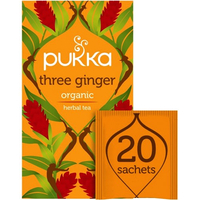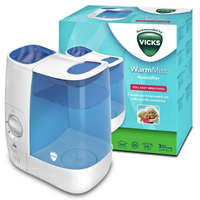Natural cough remedies: 9 expert tips to cure a cough from the comfort of your home
Treat a pesky cough with these natural cough remedies, from herbal teas to tasty snacks


Natural cough remedies are a great way to soothe a sore throat or get rid of an annoying tickle, without reaching for the medicine cabinet.
At home treatments can be effective on a range of ailments, from natural cold remedies to natural headache remedies and even natural flu remedies. Coughs can also be treated without the help of over the counter relief - which will come in handy after a number of cough medicines have been withdrawn - and some of the remedies you'll probably already have in the back of your cupboard.
Dr Deborah Lee, from Dr Fox Online Pharmacy, says "Coughing is a reflex needed to protect your lungs. When you cough, it may be because you have a dry irritated throat, an upper respiratory tract infection (URTI), or a chest infection. Dampening down a cough reflex may not always be in your best health interests, however coughing is exhausting and many people just want a period of relief, if only overnight, to help them sleep."
Natural cough remedies
1. Honey
We've all heard that honey does a great job of soothing irritated throats - it's one of the best known cures out there. But new research published in the British Medical Journal has said that honey is "superior to usual care for the improvement of symptoms of upper respiratory tract infections."
Researchers analysed studies that compared the effects of consuming honey with antibiotics and cough syrups, looking at the impact on cough symptoms including the severity, the frequency of coughs and the length of time the symptoms persisted. They found that honey had a significantly greater effect in reducing symptoms - especially when it came to the severity of the cough and the frequency of coughs - revealing that honey is both a superior and cheaper treatment.
“Honey has been used as a natural health remedy in various different cultures for thousands of years - and rightly so - given its wealth of medicinal properties,” says Dr Hussain Ahmad from Click2Pharmacy. "Honey has some great antioxidant and anti-inflammatory properties which help to protect against oxidative stress and help the body to deal with and manage symptoms of inflammation, such as a sore throat and cough.”
Dr Deborah Lee, from Dr Fox Online Pharmacy, adds “Due to its thick, viscous consistency, honey can coat and soothe the back of the throat. The use of hot lemon and honey for adults and children aged over 1 with an upper respiratory tract infection (URTI) is endorsed by the British Thoracic Society and NHS Choices.”
Try this remedy by adding some honey and a squeeze of lemon juice to hot water, or simply drizzle some honey over your morning porridge, put some into a smoothie or try a tasty recipe such as honey chicken or honey glazed parsnips.
2. Garlic
Dr Ahmad says “Garlic’s primary biologically active ingredient (allicin) has been found to be extremely useful when it comes to decreasing inflammation and reducing oxidative stress in the body, both of which can often present in the form of coughs. When we crush or slice garlic, it activates an enzyme called alliinase, which, when left to sit for a few minutes, can further increase the medicinal properties of the garlic.”
Several studies have shown that garlic has immune system-boosting properties, and one clinical trial tested this by giving half of its participants a placebo pill and the other half a garlic capsule for a period of 12 weeks. In the group taking the placebo, 65 participants suffered from the common cold, whilst in the group taking the garlic capsule, just 24 reported symptoms of a cold.
However, Dr Ahmad offers a word of caution “One thing to bear in mind is that garlic powders and garlic salts do not contain allicin, so if you want to try this remedy I’d recommend using real, raw garlic - although you may have to have a breath mint afterwards!”
3. Ginger
For centuries, ginger has been hailed as a cure-all for everything from heart diseases to the common cough. Dr Ahmad says “This spice has a wealth of powerful antioxidant, anti-inflammatory and antiviral benefits which help the body to release and flush out toxins.”
A study released in December 2020 showed that fresh ginger could stimulate our cells to move towards sites of inflammation, infection and trauma in our bodies, helping us to recover from a cough or cold. In addition, the study showed that ginger was effective in preventing viruses from attaching to our airways and stopping the cough in the first place.
To benefit from this remedy, Dr Ahmad says “One of the most popular ways of consuming ginger is to drink it in tea. I’d definitely recommend this to those who are struggling with a cough, as the steam from the tea can also help to loosen up the airways and the warm fluids will help to soothe the throat and keep you hydrated, which is really important for the immune system.”
Pukka Organic Three Ginger Tea 20 Tea Bags - £3.45 | Holland & Barrett
An infusion of ginger, galangal and golden turmeric to create a truly invigorating hot & spicy herbal tea - the perfect warming refreshment for getting rid of a pesky cough.
- View Pukka Organic Three Ginger Tea 20 Tea Bags - £3.45 | Holland & Barrett
4. Thyme
Thyme has antibacterial, anti-fungal and expectorant (ridding the body of excess mucus) properties. One study showed that a fluid extract containing thyme herb and ivy leaves helped to reduce coughing fits in a group of adults suffering from acute bronchitis with productive cough.
Dr Lee says “Thyme has been used for centuries as a herbal medicine to treat URTIs. It contains terpenes, thymol and carvacrol, which have antitussive, anti-inflammatory, antibacterial, and antiviral properties.”
Try steeping thyme leaves in hot water for 15-20 minutes to make a tea that may help to ease your cough.
5. Liquorice root
One study from 2015 has suggested that liquorice could be effective at preventing the growth of bacteria, fungi and even some viruses, alongside having anti-inflammatory and anti-oxidant properties. Another study from 2018 relays the results from a study on mice, where it was discovered that some components in liquorice could reduce the frequency of coughs by between 30% and 78%.
Dr Ahmad says “Both liquorice extracts and liquorice flavonoids have been found to play a vital role in aiding recovery from respiratory disease and fungal infections.” However, he adds “More research is needed in order to fully support this.”
To try this remedy, place one teaspoon of the dried herb into two cups of water and boil and allow it to steep before drinking. Bear in mind, however, that liquorice root is not suitable to give to children.
6. Pineapple
Pineapple might not seem like a conventional cough remedy, especially if it’s a dark winter evening where you'd much rather have a cup of hot chocolate than a pina colada.
“Pineapple has been used as a medicinal plant for hundreds of years,” says Dr Lee. “The fruit contains bromelain, which is thought to thin out bronchial mucous, and also has antibiotic properties.”

Bromelain has been proven to suppress coughs and loosen mucus in the throat, making pineapple a great remedy.
Dr Ahmad adds “Pineapples are packed with a wide variety of vitamins and minerals which help support the immune system, from vitamin C to manganese, vitamin B6, potassium and iron. I’d definitely recommend pineapple and other citrus fruits to those suffering from a cough.”
He explains that one study found a link between using honey and pineapple extract and a reduction in coughing episodes and intensity. Dr Ahmad recommends adding some pineapple to your honey chicken recipe or your smoothie, or enjoying the tropical fruit drizzled with honey at breakfast.
7. Gargling with salt water
We've all heard of this one before, but is it actually true? Well, in 2005 researchers surveyed 400 healthy volunteers and tracked their progress for 60 days during the cold and flu season. While some of the participants in the study were told to gargle three times a day, others didn’t gargle at all. By the end of the study, the group that regularly gargled had almost 40% fewer infections in their upper respiratory tract that those who didn't gargle at all.
According to Dr Ahmad, gargling with salt water is a great cough remedy. He says “As unpleasant as it may be, gargling with salt water could actually do the trick when it comes to relieving coughs caused by sore throats. Salt water, particularly when it's warm, can help to kill bacteria, ease pain and loosen mucus in the throat - just try not to swallow it!”
To make a saltwater gargle, Dr Lee advises ½ teaspoon of salt to dissolved in an 8-ounce glass of tepid water. Try and gargle for 30 seconds and repeat several times a day to feel the benefit of this remedy.
8. Probiotics
Multiple studies have show that probiotics are helpful in relieving coughs and colds, because they help our gut bacteria to keep our immune system working optimally throughout the body.
A 2015 study found that probiotics worked better than a placebo in reducing the number of participants experiencing upper respiratory infection, while a 2022 study found that probiotics reduced symptoms of coughing in people of all ages when taken on a regular basis.
While you can buy probiotic food supplements, the most natural way to up your intakes of probiotics is to eat fermented food. Foods that will help you get probiotics include:
- Yogurt
- Kimchi
- Sauerkraut
- Kombucha
- Miso
- Tempeh
- Kefir
9. Breathe in steam
Breathing in steam or trying to create a humid environment can help ease a persistent cough, because dry air can exacerbate symptoms. You could do this by taking a hot shower or bath, sitting with you face above a bowl of hot water, or you may want to invest in a humidifier.
Humidifiers emit water vapor, so they will add steam to your room. Over-the-counter medication company Vicks says "Warm steam opens and moisturizes stuffy breathing passages, and helps thin the mucus so you can cough it up and get phlegm out."
If you choose to invest in a humidifier, make sure you keep other doors shut to keep as much steam in the room as possible, and change the water frequently to make sure it stays clean.
Vicks Warm Mist Humidifier VH845E1 - £49.89 | OnBuy
This humidifier releases up to 95% bacteria-free mist into the air to help easy breathing. You can choose between 2 mist output levels (high or low), depending on the amount of moisture you want to add into the room.
- View Vicks Warm Mist Humidifier VH845E1 - £49.89 | OnBuy
Video of the Week

Having worked for many years in the NHS, mostly as Lead Clinician within an integrated Community Sexual Health Service, Dr Deborah Lee now works as a health and medical writer, with an emphasis on women's health, including medical content for Dr Fox pharmacy. She has published several books and remains passionate about all aspects of medicine and sexual health.

Click2Pharmacy’s Dr Hussain Ahmad has over 10 years experience working with patients across Europe and most recently in the North of England. He is an experienced hospital doctor working primarily in A&E in the North West and has helped covid patients that have been admitted to hospital.
As a consultant practitioner, he’s provided support and advice for a wide range of patients who struggle with a variety of different health issues. From high blood pressure to diabetes, nutrient deficiencies, sleep problems, mental health conditions and everything in between.
Goodto Newsletter
Parenting advice, hot topics, best buys and family finance tips delivered straight to your inbox.

Grace Walsh is a Features Writer for Goodto.com, covering breaking news health stories during the Covid-19 pandemic as well as lifestyle and entertainment topics. She has worked in media since graduating from the University of Warwick in 2019 with a degree in Classical Civilisation and a year spent abroad in Italy. It was here that Grace caught the bug for journalism, after becoming involved in the university’s student newspaper and radio station.
- Ellie HutchingsFeatures Editor
-
 Rochelle Humes' adorable note left by her six-year-old shows how quickly kids pick up on big changes at home - psychologist shares her top tips on how best to prepare them
Rochelle Humes' adorable note left by her six-year-old shows how quickly kids pick up on big changes at home - psychologist shares her top tips on how best to prepare themValentina picks up on what will help her mummy while daddy is away
By Selina Maycock Published
-
 Does your relationship pass the 'Beckham Test'? The viral trend is taking TikTok by storm, so how does your partner compare to the world-famous footballer?
Does your relationship pass the 'Beckham Test'? The viral trend is taking TikTok by storm, so how does your partner compare to the world-famous footballer?Is your relationship as strong as David and Victoria's? We share what the 'Beckham Test' is and how to try it for yourself
By Ellie Hutchings Published
-
 9 expert-approved home remedies for heat rash, and they're suitable for all the family
9 expert-approved home remedies for heat rash, and they're suitable for all the familySummer has arrived in the UK, and as temperatures soar you and your family might be suffering with heat rash. We've picked out the best home remedies to help treat it.
By Ellie Hutchings Published
-
 14 natural remedies for travel sickness suitable for the whole family
14 natural remedies for travel sickness suitable for the whole familyWe asked the experts for the best travel sickness remedies, so motion sickness won't both you on your family holiday this summer.
By Ellie Hutchings Last updated
-
 14 home treatments for dandruff, as recommended by doctors and hair experts
14 home treatments for dandruff, as recommended by doctors and hair expertsIf you have an itchy or sore scalp start with these home treatments for dandruff. You may even wish to try some before your scalp is producing flakes.
By Debra Waters Last updated
-
 How to whiten teeth naturally – and what not to use
How to whiten teeth naturally – and what not to useWe all want to look our best, and one way to do this is to know how to whiten teeth naturally so we can show off a bright white smile.
By Debra Waters Published
-
 12 cold sore home remedies and treatments
12 cold sore home remedies and treatmentsWhat is a cold sore? Find out everything you need to know, including causes, cold sore stages and natural remedies...
By Debra Waters Published
-
 Constipation home remedies: How to help with constipation at home
Constipation home remedies: How to help with constipation at homeIt might be a bit embarrassing, but there are many ways to relieve constipation, fast! Health expert Lucy Gornall shares her top tips.
By Emily Stedman Published
-
 12 expert-approved sunburn remedies to treat inflammation at home
12 expert-approved sunburn remedies to treat inflammation at homeWant to know how to treat sunburn at home? Check out these expert-approved sunburn remedies...
By Ellie Hutchings Last updated
-
 14 of the best natural hay fever remedies for all the family - from toddlers to teens
14 of the best natural hay fever remedies for all the family - from toddlers to teensIf over-the-counter hay fever medicines leave you drowsy, try one of our top 14 natural hay fever remedies for hay fever relief all summer long!
By Faye M Smith Last updated

